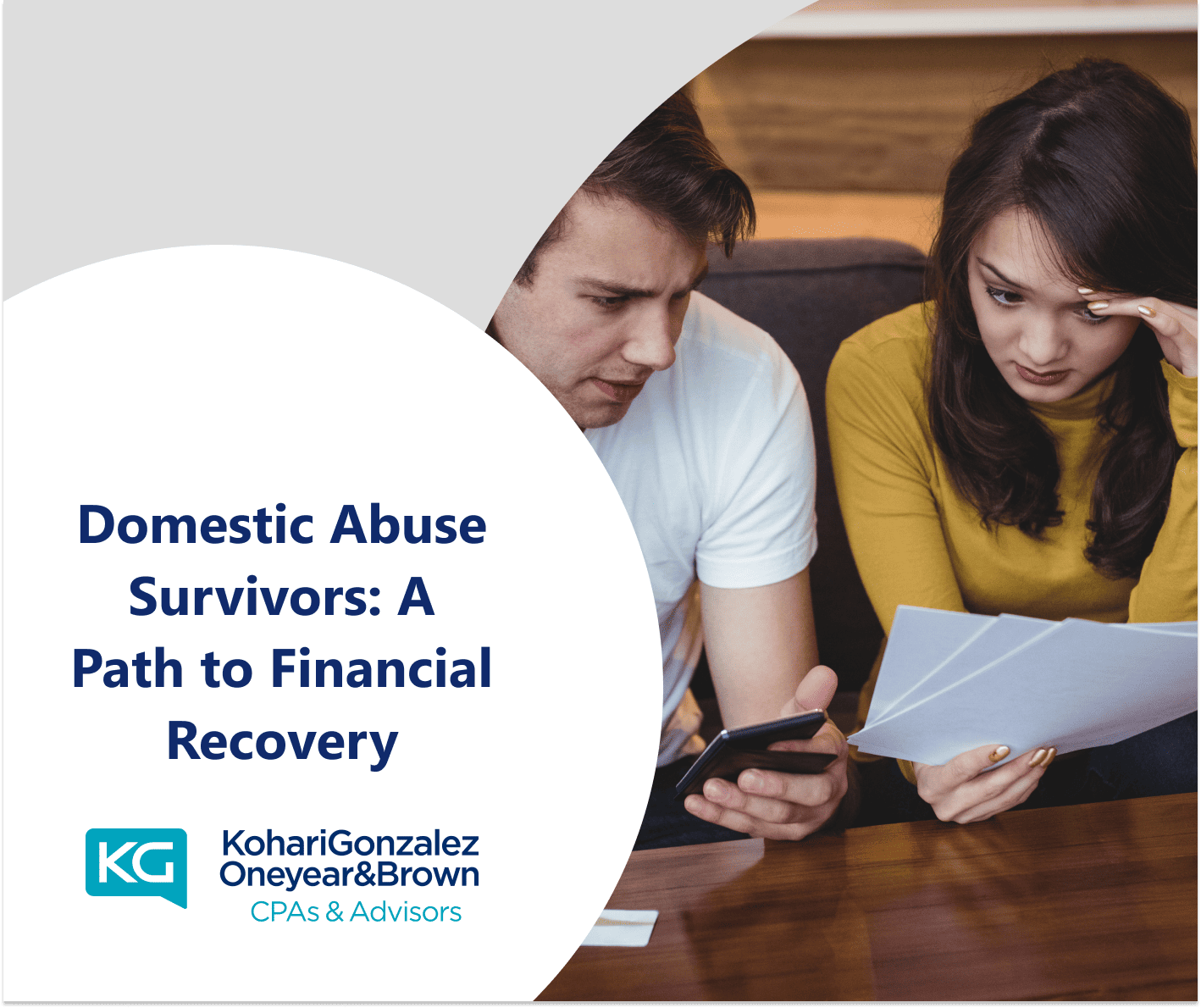
- Article Highlights:
- Joint and Several Liability in Tax Matters
- Tax Rights and Responsibilities
- Relief Options for Survivors
- Undisclosed Income and Fraudulent Activity
- Independent Filing Options
- Empowering Financial Independence
Domestic abuse frequently includes not just physical violence but also coercive control over financial assets. Survivors of domestic abuse may encounter numerous financial obstacles during their recovery, including tax issues. Survivors must grasp their rights and available relief choices to secure their economic future and give a road to financial empowerment and resilience.
Joint and Several Liability in Tax Matters
When spouses file a joint tax return, they are both liable for the tax and any additional tax, interest, or penalties resulting from the joint filing, even after divorce. This is referred to as "joint and several liability." In contrast, if filed individually, each spouse would only be liable for the liabilities shown on their respective forms.
Survivors of domestic abuse who previously filed jointly may face major financial consequences if their abusive partner engaged in tax fraud or neglected to report income. It is critical for survivors to understand that there are options to seek relief from these liabilities under specific circumstances.
Tax Rights and Responsibilities
Domestic violence survivors have a number of important tax rights that allow them to make informed financial decisions:
- Individuals have the right to submit separate tax returns, even if they are married. This option is especially useful if you are concerned about the accuracy or authenticity of a spouse's financial dealings.
- Before signing a jointly filed tax return, survivors have the right to study the whole filing, including supporting papers, for accuracy and openness.
- Survivors might refuse to sign a joint return if they suspect inaccuracies or fraudulent actions by their spouse.
- Filing delay Requests: Survivors can request a 6-month delay to gather documents or seek professional help when preparing their tax return. However, any tax estimated to be payable must be paid along with the extension request, which must be submitted by the return's due date in April.
- Access to Past Returns: Obtaining copies of earlier tax returns from the IRS can help recreate financial histories and uncover any mistakes.
- Requesting Liability Relief: If a spouse is culpable for errors or omissions that impact tax liability, survivors can seek relief to avoid unjust burdens.
- Seeking independent tax advice can help survivors navigate complex tax concerns and demand their rights.
Survivors have more than just these rights. They also have to file their taxes on time, report all of their income accurately, and let the IRS know about any changes to their personal information, including a name or address change.
Relief Options for Survivors
The IRS provides a variety of relief options to domestic violence survivors who may otherwise face tax consequences as a result of their spouse's or ex spouse's acts. This includes:
1. Innocent Spouse Relief - Innocent Spouse Relief is intended to safeguard individuals who may unwittingly get involved in tax liabilities as a result of errors or fraudulent activity undertaken by their spouse on a combined tax return. This relief is applicable under the following conditions:
- The survivor was unaware of any understatements or omissions on the combined tax return.
- Holding the survivor responsible is unjust considering their situation.
To file for Innocent Spouse Relief, a person must complete IRS Form 8857 within two years of the IRS commencing collection actions. When approved, this relief relieves survivors of the responsibility to pay additional taxes, interest, and penalties due to their spouse's misreporting.
2. Injured Spouse Relief - While the names are similar, Injured Spouse Relief focuses on situations where a joint tax refund is diverted to cover a spouse's separate debts, such as federal or state tax obligations, child support, or federal non-tax debts such as student loans. To apply for this relief, use Form 8379, which allows the injured spouse to regain their half of the joint return.
3. Equitable Relief - If neither Innocent Spouse Relief nor Injured Spouse Relief apply, survivors may still be eligible for Equitable Relief under certain conditions. This sort of remedies takes into account the complete scenario and aims to prevent unjust outcomes if a survivor is held accountable for their spouse's tax understatements or errors in filings.
Applying for Equitable Relief also requires filing Form 8857, and eligibility is determined by characteristics such as abuse, economic status, and financial expertise.
Undisclosed Income and Fraudulent Activity
Dealing with concealed income or fraudulent tax activities perpetrated by their spouse presents a substantial problem for survivors of domestic abuse. These activities can have long-term consequences on the survivor of a divorce or separation. The survivors should:
- Regularly analyze tax paperwork for anomalies and undeclared income.
- Seek Professional Advice: Consulting a tax or legal advisor can assist in assembling facts and presenting a compelling case for relief.
- Gather evidence: Documents like W-2s, 1099s, and bank statements can illustrate the genuine financial picture and refute fraudulent claims.
- Seek Tax Assistance: Early connection with a tax specialist helps survivors identify problems, acquire records, and take required procedures to obtain relief.
Independent Filing Options
When dealing with an abusive spouse, survivors have other filing alternatives besides filing jointly. Here are the available options:
1.Married Filing Separately: This option allows each spouse to file their own tax return, making them solely accountable for their individual tax liabilities. It can be useful when there is a lack of trust in how the other spouse handles funds, or when one spouse is not held responsible for any errors or fraudulent acts committed by the other spouse.
2.Head of Household: In some situations, a survivor may be eligible to file as "Head of Household," which often provides lower tax rates and a larger standard deduction than filing separately. To qualify, the survivor has to:
- Be regarded unmarried on the last day of the tax year (this may apply to split spouses under certain conditions).
- Pay more than half of your household expenses for the year.
- Have an eligible individual, such as a kid or dependant, reside with them for more than half of the year.
3.Single: If the survivor is officially divorced before the end of the tax year and has not remarried, they will file as "Single," unless they qualify for Head of Household status. This Single status may also apply if the marriage was annulled or if they were officially separated by a decree of divorce or separate maintenance.
Choosing the appropriate filing status entails evaluating the unique circumstances, probable qualifications, and maybe getting help from a tax specialist. This technique ensures that survivors of domestic violence have control over their financial position while reducing further stress or liability.
Empowering Financial Independence
Understanding and exercising your tax rights and relief alternatives is a critical step toward financial independence and stability. Survivors of domestic abuse may face difficulties in regaining control of their personal money. However, recognizing and expressing your tax rights might be critical on your route to freedom.
As previously stated, the IRS has measures in place to assist persons who are unwittingly burdened with responsibilities as a result of deceptive conduct by an abusive partner. Survivors can better manage their issues by taking use of these relief choices and actively seeking advice from competent professionals.
Rebuilding financial freedom entails more than just addressing urgent needs; it also entails creating a secure future free of the economic limits caused by previous misuse. With education, support, and educated decision-making, survivors can confidently embark on the next chapter of their life, embodying resilience and empowerment.
Please contact this office for assistance.



